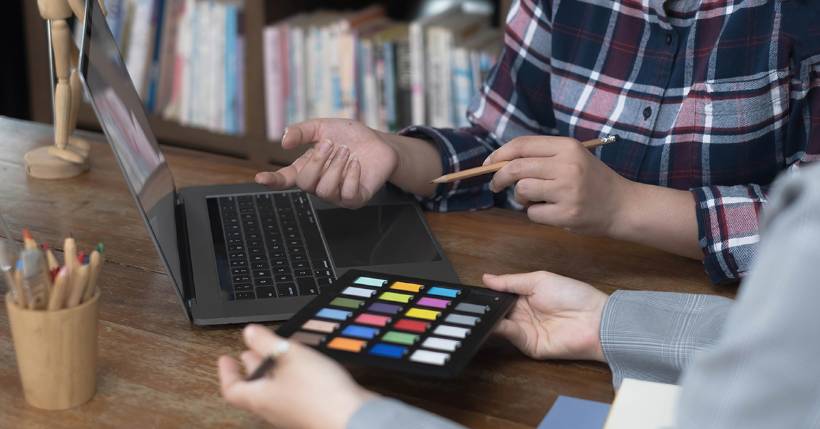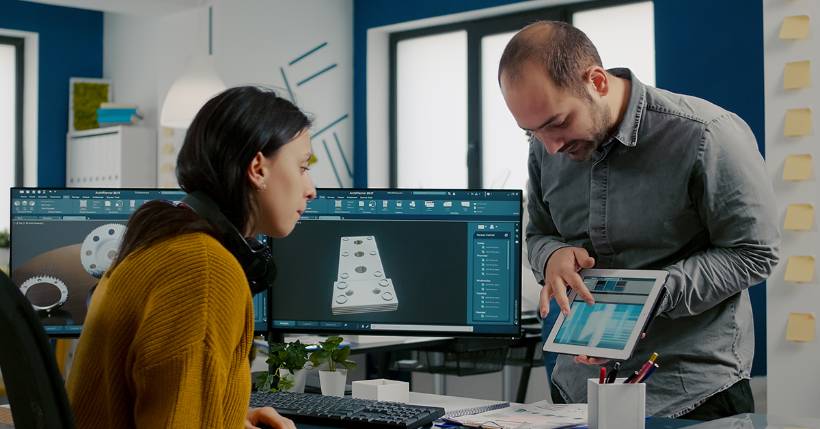How a Degree in Education with a Concentration in Learning Design Helps Shape the Future of Education

Recent advances in technology have changed the way we learn, opening up new possibilities for educators and students alike. And behind every online learning program is a team of dedicated individuals equipped with a strong understanding of digital pedagogy and learning processes.
Are you wondering how you can use your knowledge and experience to help shape the future of education? A graduate degree in Education with a concentration in Leadership in Learning Design & Technology could be the answer.
A degree in Education with a concentration in Leadership in Learning Design & Technology focuses on developing modern educational strategies and offers graduates a chance to see their theories put into practice. In this article, we'll explore how graduates of this innovative degree program help shape the future of education.
What is Leadership in Learning Design and Technology?
A Master's in Education with a concentration in Leadership in Learning Design and Technology concentration focuses on combining educational principles and technology to create and improve learning experiences. The program equips graduates with the knowledge and skills necessary to develop online learning experiences, instructional media, simulations, and other interactive learning experiences.
Students learn about best practices in curriculum design, assessment tools, research methodologies, and instructional technologies. They may also have access to various platforms such as e-learning course builders or learning management systems. An MS in Education with a concentratin in Leadership in Learning Design & Technology prepares students for professional roles in a wide variety of settings that require a combination of digital pedagogy and technology expertise.

What You'll Learn With a MS in Education Degree with a Concentration in Leadership in Learning Design & Technology
The field of Learning Design & Technology allows students to explore the intersection of education and emergent technology, combining creativity with a strong foundation in analytics and resourcefulness when creating educational content. You'll gain a comprehensive knowledge of designing online learning solutions, assessing learning outcomes and performance, media production, instructional strategies, e-learning technologies, and more. Graduates will be well-equipped to assume roles in training programs, online course development, and technology support at K-12 schools, businesses, and other educational settings.
Explore Contemporary Topics in Learning
You'll explore recent developments in theory and practices related to topics such as advances in learning and technology, governance, school safety, nonprofit organizations, policy, law, financial management of public institutions, public relations and marketing, social innovation and entrepreneurship, institutional advancement, Pre-K to 12 administration, private and charter school administration, societal factors affecting education and equity, nonprofit management and leadership, research methods and data analysis, and other similar topics.
Discover New Learning and Emerging Technologies
Through your studies, you'll explore how learning theory and emerging technologies integrate to create impactful and innovative learning that leads to improved student outcomes. You'll learn to develop strategies for applying new technologies in practice and evaluate the effectiveness of new learning technologies in the workplace.
Learn to Rethink Instruction
You'll learn to rethink instruction in the context of technology-enhanced learning in formal organizations, especially in response to new technologies and the capabilities and disruptions they bring to learning and work. You will explore concepts such as flipped classrooms, student-centered models, learning analytics, real-time embedded assessment, gainfulness, engagement through virtual learning, mobile learning, and location-based learning.

The Impact of Learning Design and Technology on Education Management
Learning Design is a rapidly emerging field that has the potential to transform the way we approach educational programs for both children and adult learners. Through innovations in learning design, educational institutions can create and manage learning experiences tailored to meet the needs and interests of learners. By leveraging digital technology, educators can optimize and maximize student engagement, acquire in-depth insights into student performance, and facilitate collaboration between students and teachers. This shift in approach not only allows for greater flexibility in teaching strategies but also creates better learning outcomes overall, improving student success rates and reaching more audiences than ever before.
Create Equitable Learning Opportunities
The use of learning design and technology is a powerful tool for creating equitable learning opportunities in the classroom. By utilizing technology to foster active student engagement, teachers can create online programs or blended learning environments that are accessible and equitable for all students, regardless of their socio-economic background or ability level.
Technology allows teachers to provide supplemental resources, scaffolding, and differentiated instruction to meet the needs of all learners. Technology also helps empower students through personalized learning experiences, which encourages both collaborative participation as well as self-directed exploration. With effective implementation of learning design and technology, teachers can ensure that all students have access to a quality education that meets their individual needs.
Utilize Technology to Make Classrooms Interactive and Informing
Utilizing technology and online options in the classroom makes learning more collaborative and interactive, providing a forum for students to exchange ideas and opinions about topics. Technology in the classroom opens a world of possibilities that make it easier for teachers to engage their students in educational pursuits.
Build Innovative Approaches to Make Learning Fun & Productive
With the help of modern technology, teachers and educators have access to an ever-growing selection of digital tools to bring collaborative learning projects and activities into their classrooms. Interactive simulations, virtual field trips, 3D printing, augmented reality apps, interactive whiteboards—all these technologies offer a wide range of possibilities for personalizing student education and increasing motivation.
By making use of the latest trends in educational technology, educators are able to cater to diverse learning styles and support physical distancing among students in order to maintain safety during the COVID 19 pandemic.
Elevate Teacher Professional Development
An essential part of improving student success is helping teachers improve their professional skills with high-quality, relevant professional development opportunities. By providing teachers with ongoing learning opportunities that allow them to expand their knowledge and skills, we are helping them to be better prepared for the ever-changing classroom environment.
Professional development also helps to ensure that teachers are up to date on the latest curriculums, standards, and technologies. With these resources at hand, teachers can help students reach higher academic achievements and exceed their goals.

Career Opportunities with a MS Education Degree with a Concentration in Leadership in Learning Design & Technology
Earning a Master's in Education degree with a concentration in Leadership in Learning Design & Technology can open up many exciting opportunities, no matter what your career goals are. You will be well-prepared to work in positions such as instructional design, learning content management, distance learning, and eLearning.
Professionals with an MS Education degree with a concentration in Leadership in Learning Design & Technology are employed by educational institutions, corporate training departments and firms, technology-based organizations, web design firms, and healthcare settings.
Here are some options for future careers with a MS Education with a concentration in Leadership in Learning Design & Instruction degree:
- Director of Teaching and Learning: A Director of Teaching and Learning is responsible for overseeing instructional initiatives and leading the development of curriculum and policies. This person is often the highest-ranking leader for all instruction-related matters, monitoring and evaluating student progress, providing professional development opportunities to staff, and creating effective teaching models. They must have a deep understanding of academic concepts, be well versed in technology, work to foster collaborative relationships among educators, and be able to appraise both the individual needs of students as well as overall trends in the educational system.
- Curriculum Designer/Instructional Designer: Curriculum designers or instructional designers ensure that online curriculum is optimally designed to help users learn effectively. They create educational materials such as lesson plans, tutorials, and interactive content that can be used in corporate training programs or by teachers in traditional classrooms. Instructional designers are familiar with educational technology such as learning management systems, multimedia technologies like video and animation, internet-delivered content, mobile applications, and game-based learning.
- Professional Development Coach: A professional development coach helps educators increase their effectiveness and maximize their potential. Coaching typically involves observing, communicating with teachers and administrators, strategizing on effective learning approaches, providing resources and tools, and giving feedback. Professional development coaches can help educators refine their teaching style, utilize current trends in educational technology, increase their understanding of standards-based curriculum alignment, increase instructional leadership skills, and more. Professional development coaching can also involve developing goals for teachers implementing program evaluation systems or even helping administrators lead district transformation initiatives.
- Instructional Technology Specialist: An Instructional Technology Specialist provides technical and organizational support for educational systems, such as helping educators to implement technology into their lessons, managing data, providing computer security, and helping users troubleshoot technical issues. IT Specialists also design networks, websites, and software applications which can be used by the students, faculty, and administrators of a school to get the most out of their digital environment.
- eLearning Developer: An eLearning Developer is often a business professional who prepares instructional materials and programs for onboarding or job-related training in workplace settings. They use a variety of tools, such as coding, multimedia and animation software, to create engaging and interactive learning experiences that enable users to learn while they explore the content. Additionally, they help maintain databases related to the user experience in order to enhance their training delivery process.
Become an Instructional Designer With an MS in Education with a Concentration in Leadership in Learning Design and Technology at Pepperdine University
The MS in Education with a concentration in Leadership in Learning Design and Technology from Pepperdine University is designed for professionals who wish to advance their career in instructional design and technology. Courses focus on different topics such as research, curriculum development, assessment design, educational technology, and course design. Students will learn how to develop engaging learning materials that are impactful and flexible to ensure they meet the needs of learners across all age groups. By completing this program, graduates will be prepared to enter new careers or progress in current positions that require knowledge of best practices in instructional design.
For more information on admission requirements, the application process and application deadlines, and financial aid opportunities, including scholarship funding, learn more here.
Ready to get started? Learn more about applying for the MS in Education with a concentration in Leadership in Learning Design and Technology program here.